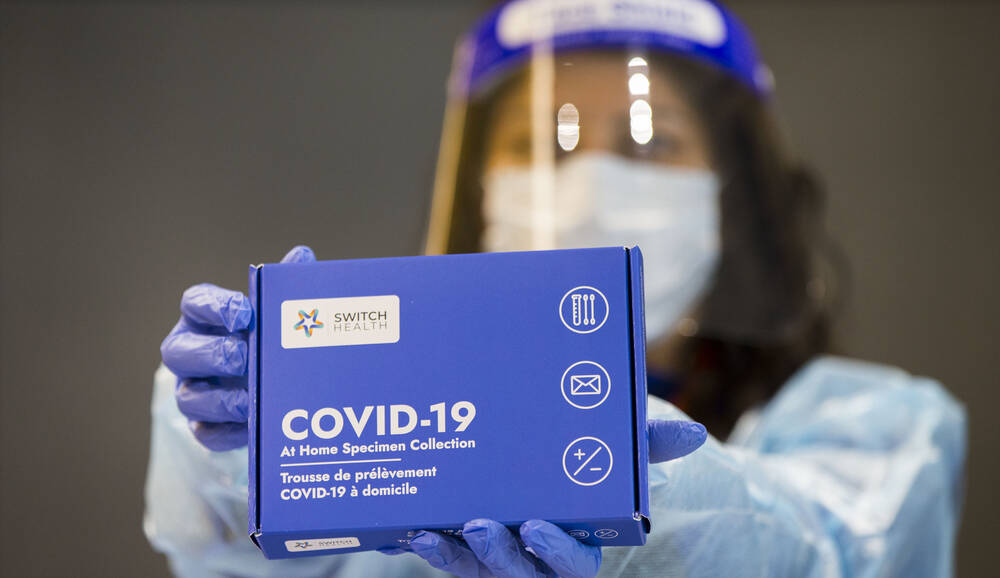Never buy a COVID test without doing these 4 things, experts warn. Avoid falling victim to a dangerous scam with these precautions.
Be careful of scams involving rapid tests
.
Between the Omicron surge and the vacation season, long lines at COVID testing sites have become the norm. More people are turning to another option: home rapid tests that can be purchased in stores or online. But the health department is now warning about a dangerous new scam that could put your health at risk: counterfeit COVID test kits for home use.
“Using these counterfeit products is not only a waste of money, but also increases the risk of unknowingly contracting COVID-19 or not getting the right treatment,” the organization says. The good news? There are simple steps you can take to protect yourself from scams. Read on to find out the four things experts say you should always do before buying a COVID test.
1. Make sure the test is approved by the authority
.
The FTC’s first tip is perhaps the most important for your health and safety: make sure the product you buy is FDA approved. To find out, you can search the FDA’s lists of antigen diagnostic tests and molecular diagnostic tests for the name of the test you are considering.
Although it may be difficult to get your hands on these tests, there are hundreds of approved brands. The FDA has approved more than 420 types of COVID tests, including more than 300 diagnostic and 90 serologic tests (as of Nov. 15, 2021), the organization reports.
The FDA emphasizes that buying an approved test is critical to your personal health – and also has broader implications. “In the context of a public health emergency involving pandemic infectious disease, it is critical that tests are validated, as false results can not only have a negative impact on the individual patient, but can also have a broad impact on public health,” the FDA’s revised “Policy for Coronavirus Disease 2019” states. “False-positive results on diagnostic tests, for example, can lead to unnecessary quarantine measures, wasted resources for contact tracing and testing, and delays in accurately diagnosing and appropriately treating the individual. False negative results can result in the individual not receiving appropriate treatment and further spread of the disease,” the agency warns.
2. Search online for the name of the vendor.
The FTC’s second recommendation can and should be applied to just about any purchase you make from an online seller you don’t know, so do a little research before you buy. By searching for the company or seller’s name and terms like “fraud,” “complaint” or “review,” you can quickly determine if previous buyers have had problems with their purchases, according to the government organization. Even if you make your purchase through large, well-known sales websites like Amazon, this is considered a best practice – especially for a product as important as a COVID test.
3. Compare online reviews – and watch for red flags.
.
Next, compare online reviews from different COVID test providers, the FTC says. “You can get a good idea of a company, product or service by reading user reviews on various retail or shopping comparison sites,” the agency said.
Nevertheless, it’s important to interpret reviews with a healthy dose of skepticism. “Think about the source of the review,” the FTC says, noting that many reviews can be fake – either written by the sellers themselves or purchased. “Ask yourself: Where did this review come from? Is it from an expert organization or from individual customers?”
One way to spot sellers with fraudulent reviews is to sort them by date, if possible. If you notice that many positive reviews were posted around the same date, the likelihood of a scam is higher.
4. Pay by credit card
.
Make sure you pay for your purchases with a credit card – preferably one where you can easily dispute a charge. That way, you have recourse if you never receive your order or if the product is not as advertised, the FTC says.
It’s also worth noting that the Internal Revenue Service considers COVID home tests to be a reimbursable medical expense for tax purposes. That means they can be paid or reimbursed under flexible health spending arrangements (health FSAs), health savings accounts (HSAs), health reimbursement arrangements (HRAs) or Archer medical savings accounts,” the agency wrote in a press release issued in September 2021. Masks, hand sanitizers, disinfectant wipes and personal protective equipment may also be reimbursed under these plans.
